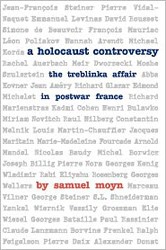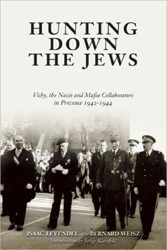This academic monograph opens up a field not familiar to most general readers, even those who use libraries frequently: the traffic in manuscripts and documents that provide the backbone for archives and special library collections, especially in Judaica. Leff’s focus is on an historian who wrote under the name of Zosa Szajkowski, who at the same time that he was authoring a prodigious number of articles and books on the history of French Jewry (and accomplishing the goal of Leff’s subtitle) was also systematically pillaging the very archives where he did his research and subsequently selling off his takings.
Szajkowski (pronounced Shy-KOV-ski) was born in Poland in 1911, moved to Paris in the late 1920s, and eventually escaped Hitler’s Europe to the United States in 1941. While living in pre-war Europe, Szajkowski (born Yehoshua “Shayke” Frydman) shifted from Communist-inspired journalism to Jewish scholarship under the tutelage of Ilya and Riva Tchernikower, leaders of YIVO’s French branch. Despite his lack of a formal advanced education, he wrote several groundbreaking studies of Jews in France in the pre-and post-Emancipation era. After his escape to the United States, Szajkowski returned to Europe as a G.I. and in the post-war period, while serving with the occupying forces in Germany, he began a systematic pillaging of documents and materials from Nazi archives, shipping them to YIVO in New York. His efforts were, as Leff notes, a drop in the bucket of the flood of documents flowing out of war-ravaged Europe, some of it flowing through legal and official channels operated by Allied commissions of restitution, some flowing illegally but with the connivance or indifference of the authorities. Szajkowski’s finds and his accomplishments earned him praise from YIVO, gave him greater standing in the scholarly community, and earned him a place in YIVO’s organization. In the late 1940s and through the 1950s, Szajkowski continued his research in French archives and published many more studies (Leff’s listing of his collected works takes up nine pages in her bibliography). His work, however, became increasingly marginalized in mainstream historical Judaic studies (he was more interested in assembling facts than in larger questions of synthesis), and suspicions grew about his pilfering documents and selling them to major collections in the U. S. and Israel. It was not until 1961, however, that he was caught red-handed by librarians in France, although not charged with theft, and another decade passed before he was finally arrested in New York. Several days after his arrest he was found dead in a hotel bathroom in midtown Manhattan.
Leff attempts to account for Szajkowski’s motivations and she puts him in the context of other post-war operations to salvage the memorabilia of European Jewry. He did what many were doing, although his motivation may have turned from the altruistic attempt to preserve an endangered tradition to mere self-preservation (he needed the materials for his research; he needed the money from their sale to live on). She sees Szajkowski as a tragic figure, but she also has critical things to say about the libraries and collections that bought his pilfered materials without raising too many uncomfortable questions about their provenance. For the scholarly audience, the book raises many theoretical issues of library management and the preservation of historical materials; for general readers it is a fascinating glimpse into a little-known aspect of recent Jewish history.
Notes; bibliography.
Related Content:
- Reading List: Paris, France, and French Jews
- Leslie Maitland: Stumbling Stones
- Alexis Landau: Suite Francais
Meet Sami Rohr Prize Finalist Lisa Moses Leff
Jewish Book Council is proud to introduce readers to the five emerging nonfiction authors named as finalists for the 2016 Sami Rohr Prize for Jewish Literature. Today, we invite you to learn more about Lisa Moses Leff and her book, The Archive Thief: The Man Who Salvaged French Jewish History in the Wake of the Holocaust, about a historian who wrote under the name of Zosa Szajkowski as the author of a prodigious number of articles and books on the history of French Jewry while systematically pillaging the very archives where he did his research and profiteering off his plunder.
A warm congratulations to Lisa and the other four finalists: Dan Ephron, Aviya Kushner, Adam D. Mendelsohn, and Yehudah Mirsky. Be sure to check back soon to see which of these authors will be taking home $100,000 prize!
What are some of the most challenging things about writing nonfiction?
What you see on the page is such a small part of the work that’s behind it. I’ve had friends express total shock when they hear that it takes academic historians like me a decade to write a book. There’s so much research that goes into this that never sees the page, so much thinking that was necessary before you even put the story together, and then even after that there are false starts, discarded drafts, so much left out.
What or who has been your inspiration for writing nonfiction?
I love books that make you think and feel at the same time. I love books that are able to invoke big philosophical ideas and then make you really understand on a gut level what those ideas mean by connecting them to a story or an image. Some of my favorite history books do that — for example, Daniel Mendelsohn’s The Lost. I recently reread Roland Barthes’s Camera Lucida, which isn’t a history book at all, it’s a theory of photography, but it works in a similar way.
Who is your intended audience?
I write different things for different audiences, but with The Archive Thief, I’ve been so happy that the book is reaching people who knew nothing about the topic before, as well as academic experts. That’s what I was hoping for. When I’m writing, I always imagine my students, many of whom come to my classes knowing nothing at all about the topic or even the method of studying history. But I find that if I explain it right, they’ll see what’s interesting and be able to engage, often to the point that they’re able to offer useful criticism or take the ideas to a new level. This is how I imagine my readers, too.
Are you working on anything new right now?
Yes, I’m writing a history of the Panama Affair, which was a financial and political scandal involving corruption in the French company that started to build Panama Canal. The scandal broke in France in 1892, right before the Dreyfus Affair, and really catalyzed the anti-Semitic movement we associate with that period. In spite of all evidence to the contrary, anti-Semites explained the Panama Canal Company’s corruption — which in reality grew out of the structural weaknesses of the banking system and the newly established democracy — as a Jewish conspiracy, claiming that Jews controlled the banks and had democratically elected politicians and the free press in their pocket.
What are you reading now?
I’m reading Tara Zahra’s new book, The Great Departure, a history of emigration from Eastern Europe. It’s beautifully written and puts Jews and non-Jews together in the same story, which is so rare and so enlightening.
If you had to list your top five favorite books…
The Memoirs of Gluckel of Hameln
A History of the Grandparents I Never Had by Ivan Jablonka
A Tale of Love and Darkness by Amos Oz
Reading Lolita in Tehran by Azar Nafisi
Call It Sleep by Henry Roth
When did you decide to be a writer? Where were you?
In third grade, I had a wonderful teacher who had us write stories in a notebook. I still have that notebook and love looking at it. I remember thinking that I had endless ideas for stories but always got frustrated with how they turned out. I felt like I could never get my stories to come alive. Writing nonfiction, especially in an academic setting, is a little different, but even there you want your prose to be clear enough so that people can understand things in a new way, so I often still grapple with that same frustration: how do you make your ideas really sing?
What is the mountaintop for you — how do you define success?
I think there’s a certain trap in measuring success by external markers, though of course it’s wonderful to get a prestigious job or win a fellowship or a prize. But aiming to get those things can sometimes distract you from what’s really worthwhile and what makes for a meaningful life. I think real success is in finding a way — materially, practically, intellectually, emotionally — to keep working over the very long haul, to try new things even when they involve risk, to hear people when they tell you something valuable. Putting it in terms of the question, I’d say that rather than looking to reach a “mountaintop,” I’m more focused on staying on the journey.
How do you write — what is your private modus operandi? What talismans, rituals, props do you use to assist you?
Writing can be slow so patience is really important! When I was writing my dissertation I said to myself that if I could write a page a day, I’d be done in a year. I know writing doesn’t ever really work like that: sometimes it takes a week to write a page, and some days I’m on a roll and can’t stop writing. But when I really can’t stand it, sometimes I still say to myself, “A page a day means I’m done in a year,” because even now it puts things in perspective and gives me the patience I need to just sit and try again.
What do you want readers to get out of your book?
A lot of things! But I’d really love it if readers were really able to understand the ambiguity at the heart of the story. This is a story of someone who did something that was deeply shameful and wrong, something criminal. At the same time, he was heroic and brave, and in the long run, what he did was as valuable as it was destructive. I think especially in Jewish nonfiction, we’ve got a lot of stories about heroes, maybe too many. I think we’re sometimes too afraid to tell stories that challenge Jewish respectability. But stories like Szajkowski’s are just as important to tell and to think about, because they’re in many cases closer to real life and very much part of Jewish history.
Lisa Leff is a historian of Europe since 1789, whose research focuses on Jews in France. She is an associate professor of History at American University in Washington, DC. She received her BA from Oberlin College and her PhD from the University of Chicago.
Related Content:





